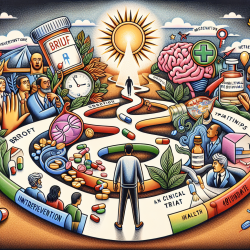The concept of guardianship often presents a complex challenge for clinicians, especially when dealing with vulnerable populations such as older adults with dementia. The research article "Guardianship: A medicolegal review for clinicians" provides valuable insights into this intricate area, offering guidance on how practitioners can improve their skills and understanding of guardianship issues.
The Ethical Dilemma
One of the primary ethical dilemmas in guardianship is balancing the protection of vulnerable patients with respecting their autonomy. Older adults with cognitive impairments are particularly at risk of losing their independence and decision-making abilities. This necessitates a careful assessment of their capacity to make medical decisions.
Understanding Capacity Assessments
The ability to make informed medical decisions requires individuals to understand relevant information, appreciate their circumstances, demonstrate reasoning, and express a consistent choice free from coercion. While capacity assessments are typically task-specific, geriatricians and other specialists may be asked to provide a more global assessment of an individual's capacity.
The Role of Guardians
If a patient is deemed incapable of making informed decisions, a guardian may be appointed through a legal process in probate court. Guardians can be family members or professional guardians who have no prior relationship with the ward. They are encouraged to use substituted decision-making, considering the ward's previously expressed values and preferences.
Alternatives and Systemic Barriers
The research highlights that numerous viable alternatives to guardianship exist but are often hindered by systemic barriers. Practitioners should explore these alternatives thoroughly before proceeding with guardianship. Moreover, the ongoing need for guardianship should be periodically reassessed to ensure it remains necessary.
The Importance of Data and Legal Variability
A significant challenge in the field is the lack of centralized databases on guardians and wards. Additionally, laws and regulations regarding guardianships vary significantly between states, adding another layer of complexity for practitioners.
The Clinician's Role as Advocate
Clinicians play a crucial role as allies and advocates for patients at risk of losing their decision-making abilities. By preserving patient autonomy for as long as possible and ensuring appropriate protections are in place when needed, practitioners can significantly impact their patients' quality of life.
This research underscores the importance of continuous learning and adaptation in clinical practice. Practitioners are encouraged to delve deeper into the topic to enhance their understanding and improve patient care outcomes.
To read the original research paper, please follow this link: Guardianship: A medicolegal review for clinicians.










